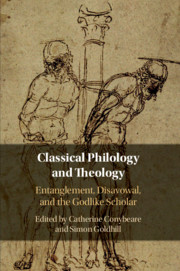Book contents
- Classical Philology and Theology
- Classical Philology and Theology
- Copyright page
- Contents
- Contributors
- Chapter 1 Philology’s Shadow
- Chapter 2 Philology’s Roommate: Hermeneutics, Antiquity, and the Seminar
- Chapter 3 The Union and Divorce of Classical Philology and Theology
- Chapter 4 The Philology of Judaism: Zacharias Frankel, the Septuagint, and the Jewish Study of Ancient Greek in the Nineteenth Century
- Chapter 5 Source, Original, and Authenticity between Philology and Theology
- Chapter 6 Whose Handmaiden? ‘Hellenisation’ between Philology and Theology
- Chapter 7 Julian the Emperor on Statues (of Himself)
- Chapter 8 Boethius in the Genres of the Book: Philology, Theology, Codicology
- Chapter 9 Virgil, Creator of the World
- Chapter 10 Theology’s Shadow
- Bibliography
- Index
Chapter 3 - The Union and Divorce of Classical Philology and Theology
Published online by Cambridge University Press: 03 September 2020
- Classical Philology and Theology
- Classical Philology and Theology
- Copyright page
- Contents
- Contributors
- Chapter 1 Philology’s Shadow
- Chapter 2 Philology’s Roommate: Hermeneutics, Antiquity, and the Seminar
- Chapter 3 The Union and Divorce of Classical Philology and Theology
- Chapter 4 The Philology of Judaism: Zacharias Frankel, the Septuagint, and the Jewish Study of Ancient Greek in the Nineteenth Century
- Chapter 5 Source, Original, and Authenticity between Philology and Theology
- Chapter 6 Whose Handmaiden? ‘Hellenisation’ between Philology and Theology
- Chapter 7 Julian the Emperor on Statues (of Himself)
- Chapter 8 Boethius in the Genres of the Book: Philology, Theology, Codicology
- Chapter 9 Virgil, Creator of the World
- Chapter 10 Theology’s Shadow
- Bibliography
- Index
Summary
This chapter investigates the disciplinary formation of Classical Philology as an especially privileged subject in the nineteenth-century university, and the degree to which it overlapped happily with theology. It looks at how the two fields, both committed to the study of antiquity, shared methodology, ideology and an approach to education. It investigates how particular scholars straddled both fields in a way that subsequent historiography and disciplinary silos have worked to conceal – and how specific books became the site for shared intellectual perspectives. The chapter explores this through the career of Benjamin Jowett, as an exemplary figure who straddles both fields. Finally, it considers how twentieth-century historiography and the self-representation of scholars in theology and philology have enacted an increasingly sharp divide between the two disciplines, and explores its reasons and consequences.
Keywords
- Type
- Chapter
- Information
- Classical Philology and TheologyEntanglement, Disavowal, and the Godlike Scholar, pp. 33 - 62Publisher: Cambridge University PressPrint publication year: 2020
- 2
- Cited by

